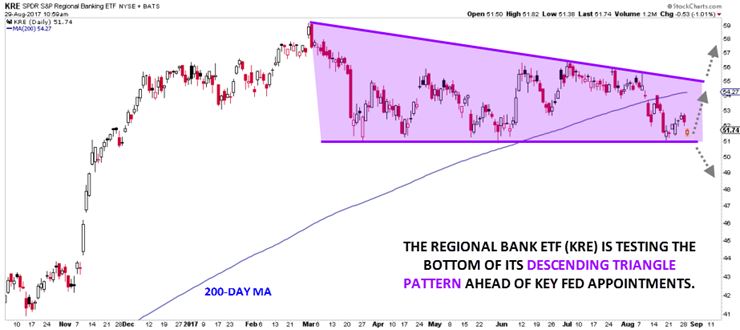Investing.com’s stocks of the week
Many market participants, ourselves partly included, were disappointed in Fed Chair Janet Yellen's lack of meaningful commentary on the economy and market policy in Friday's highly-anticipated Jackson Hole Symposium speech. What she didn't say (i.e.not implying that the Fed was likely to raise interest rates again this year) has still had a substantial market impact, but we don't want to downplay the significance of what she did discuss either.
Yellen laid out a passionate defense of the benefits of increased regulation in the wake of the Great Financial Crisis, putting her firmly at odds with President Trump, who's made rolling back regulations a centerpiece of his presidency. Dr. Yellen noted that additional regulations had had no "readily apparent" adverse effects on the economy and that “any adjustments to the regulatory framework should be modest.” In our view, Yellen's non-conciliatory approach toward the US President's agenda makes it less likely that Trump will reappoint her to head the central bank when her term expires in less than six months.
Not surprisingly, Trump has expressed a clear desire for "low interest rates" from the US central bank (as do most sitting politicians), making former Goldman Sachs) COO (and current chief economic advisor to the president as well as Director of the National Economic Council) Gary Cohn the current frontrunner. Based on public comments, Cohn would likely mirror many of Yellen's characteristics; specifically, he appears to be a pragmatic consensus-builder with a slight dovish lean.
Where Cohn would differ dramatically from Yellen would be in his outlook toward regulation. As a dyed-in-wool banker, Cohn has publicly advocated for easing financial regulations on small lenders and scaling back the Fed's annual stress tests.
It's also worth noting that there are currently three open seats on the seven-member Federal Reserve Board, and traditional stalwart Stanley Fischer's term expires in June of next year, so Trump will have plenty of latitude to form the central bank around his vision (assuming Congress cooperates by approving his nominees).
The banking sector, specifically smaller regional banks, would undoubtedly be one of the biggest winners of a deregulation-focused Fed. As the chart below shows, the SPDR S&P Regional Banking (NYSE:KRE), the regional banking ETF, is testing the bottom of a six-month descending triangle pattern near 51.00.
Moving forward, traders should keep a close eye on developments in Washington to help handicap whether the ETF will bounce from that support level, or whether it's more likely to break and see a deeper pullback toward the mid-40s in the coming months.

